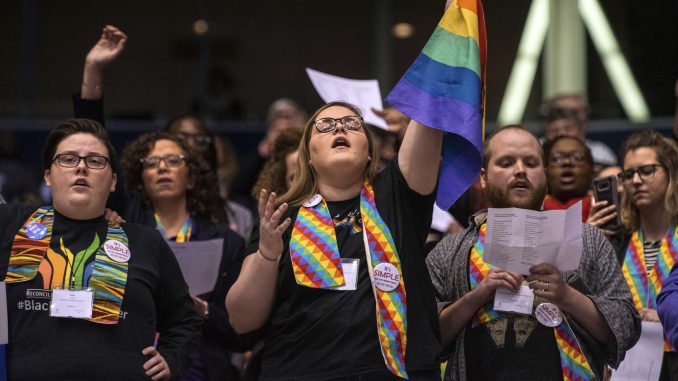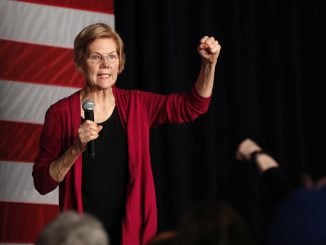
RALEIGH — In the wake of a February 2019 worldwide United Methodist General Conference that voted to strengthen the denomination’s stance supporting a traditional definition of marriage, North Carolina’s two conferences voted to reject this decision in their annual meetings. They also selected delegates for the 2020 General Conference supportive of gay marriage and other pro-LGBT reforms.
The Traditional Plan, which was passed in February and then declared constitutional in April, after a challenge in the UMC Judicial Council, not only maintained language in the Book of Discipline stating “The practice of homosexuality is incompatible with Christian teaching,” but it also added penalties for performing marriages and ordinations of gay members in opposition to this teaching.
The plan passed, despite overwhelming opposition by the United States church leadership, after African delegates were able to gather a conservative majority in the global vote. African power over church decisions will only continue to grow as U.S. church membership declines and African numbers increase.
At local conferences across the United States this summer, progressive activists were highly organized and determined to achieve larger delegate numbers for the pro-LGBTQ cause. With a unanimous vote from U.S. delegates in the 2020 General Conference in Minneapolis, the progressive caucus would be able to defeat global conservatives — and they made many gains towards that goal.
In the Carolinas, there was a virtual sweep for the progressives and their preferred delegates. In the South Carolina Conference, all eight delegates selected for the GC were from the progressive caucus as well as seven of the eight alternates.
In the North Carolina Conference, one young pastor, who identified as part of the progressive side but wished to remain anonymous, told North State Journal the progressives had a sophisticated texting and email update system that told them which candidate to vote for, which round to vote for them in, what their clergy identification number was and how the effort was going in other states.
Much of the pro-LGBT organization was done through UMC Next, a recently-formed group that claims to have active delegates from every local conference in the country working to elect more LGBT-friendly delegates.
The Western North Carolina Conference, which covers roughly the Triad and everything west, and the North Carolina Conference, which represents Alamance County and east, each met in late June for their annual conferences, a highly democratic form of church governance with caucuses, delegates, voting and public comment.
Both North Carolina conferences voted to reject the Traditional Plan. This was mostly a symbolic gesture since local annual conferences cannot undo actions by the global general conferences held every four years, but it’s a sign that the 2019 general conference in St. Louis did not put the issue to rest.
The progressive eastern N.C. pastor says the traditional side, which has gathered under the Wesleyan Covenant Association (WCA), is very well organized and is already hinting they may spin off into their own denomination.
“The right is much more organized, and you can see that with how the WCA has lawyers involved; they have a newsletter; they have funding,” he said.
But conservative backers of the Traditional Plan see the pro-LGBT side as being the more organized group, and also see church leadership as putting their thumbs on the scales for the progressive side.
Rev. Charles Kyker of Christ Church in Hickory is Western North Carolina’s representative for the WCA. Kyker, told NSJ that he believes the Traditional Plan was just a continuation of what it’s always meant to be Methodist.
“It used to be that we held the Bible to be primary in our theology. But now, apparently you can pick and choose what you like and what you don’t,” Kyker said.
The progressive pastor from the North Carolina Conference said progressives see the current language on sexuality as not only unconstitutional for the church but bordering on illegal.
“If you were to take this language into the workplace or into corporate America, the language would be illegal. It’s discriminatory against someone’s sexuality. So if it’s illegal in our state, why should it be considered constitutional in our church?”
Because the two positions are so deeply held and so divergent, the one thing that both seem to agree on is that a split may be necessary.
“The current relationship among United Methodists is untenable, and it’s beyond repair,” Kyker said when asked if, depending on what happens in Minneapolis next year, the WCA would consider forming a new denomination. “I’m not saying any side is going to do this or that. But that’s just the reality. It’s beyond repair.”
The fractured state of the church was felt by all sides during the 2019 annual meetings in both N.C. conferences.
“There was definitely some palpable anxiety in the room,” said the progressive eastern N.C. pastor. “We were sitting shoulder to shoulder with people who very vehemently and audibly disagreed with us. Many of the votes were straw polls, so people had to physically raise their hands and reveal their positions to those around them.”
A conservative Methodist pastor, who preferred to remain anonymous, also attended the N.C. 2019 Annual Conference and said he too felt the disunity in the room.
“I was so overwhelmed afterwards, I came home and slept for four or five hours. Some of the things I saw people from the left say, many of whom I consider good friends, people who preach about love and inclusion, they were intentionally excluding all opposing opinions. I’ve been praying all along, ‘God if I need to change my attitude on this, you need to let me know,’ but I just can’t see it. This is one of the most polarizing things I’ve ever seen. I don’t know if there’s any way for everyone to live under the same roof.”
Both conservative North Carolina pastors said their sources tell them that while the progressive side did make large gains in local conferences across the country, they did not achieve quite enough to overturn the Traditional Plan in the 2020 General Conference in Minneapolis.
“I think those who want to be more ‘progressive’ will likely leave, but the traditional Methodist Church will be here,” said the conservative eastern N.C. pastor.
“I’ve been a pastor for 32 years and divorce is always messy, but so is childbirth,” said Kyker. “And I don’t see this as divorce. I see it as God birthing something new.”

